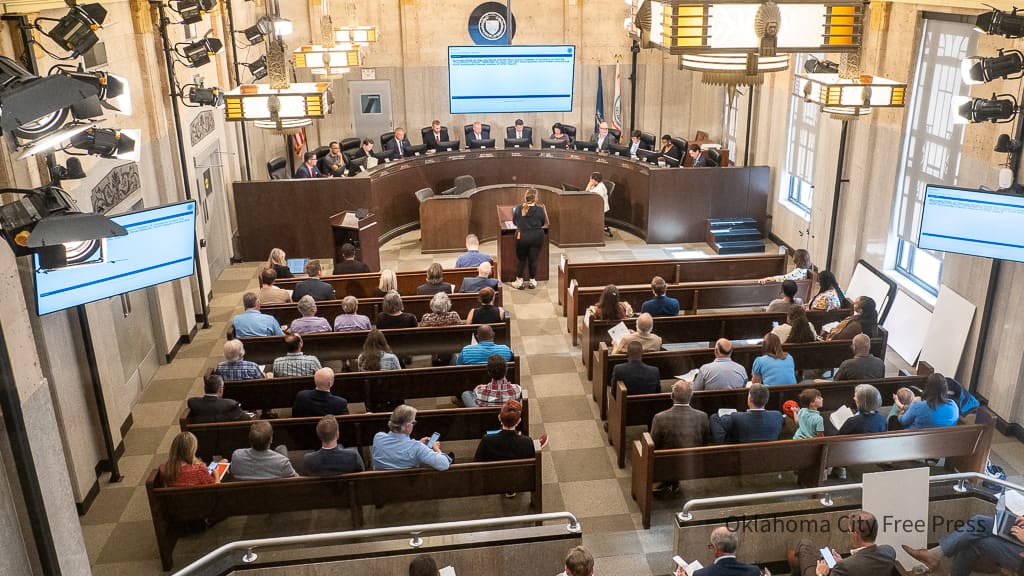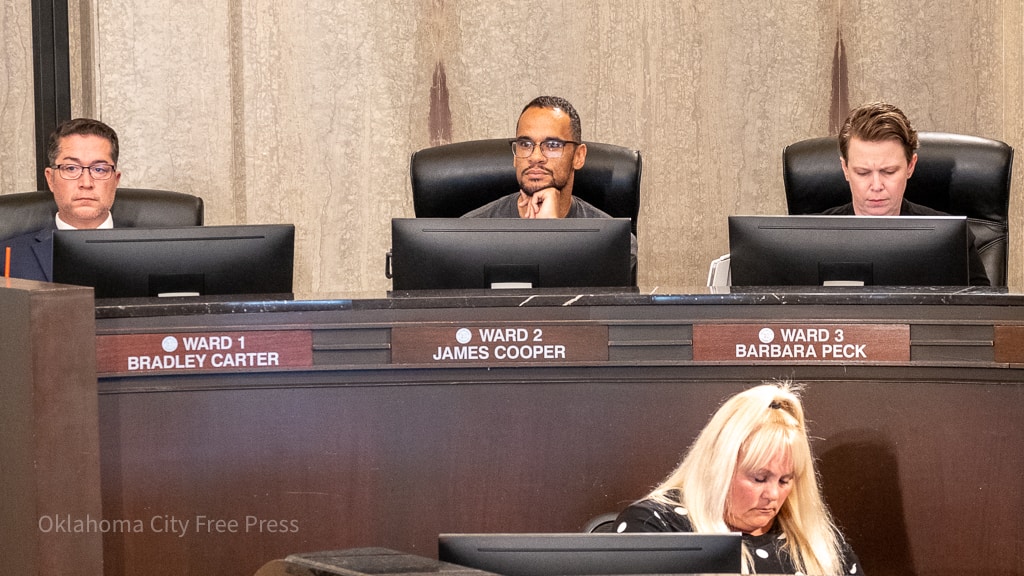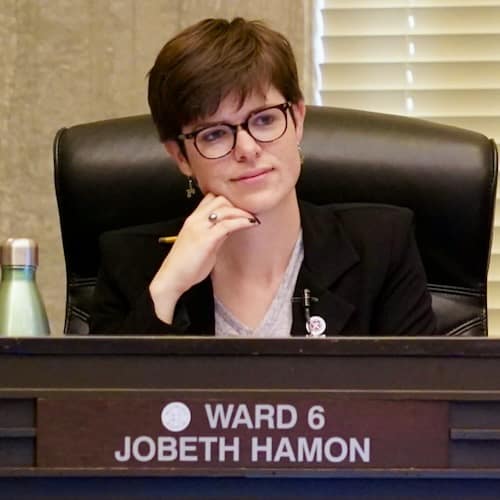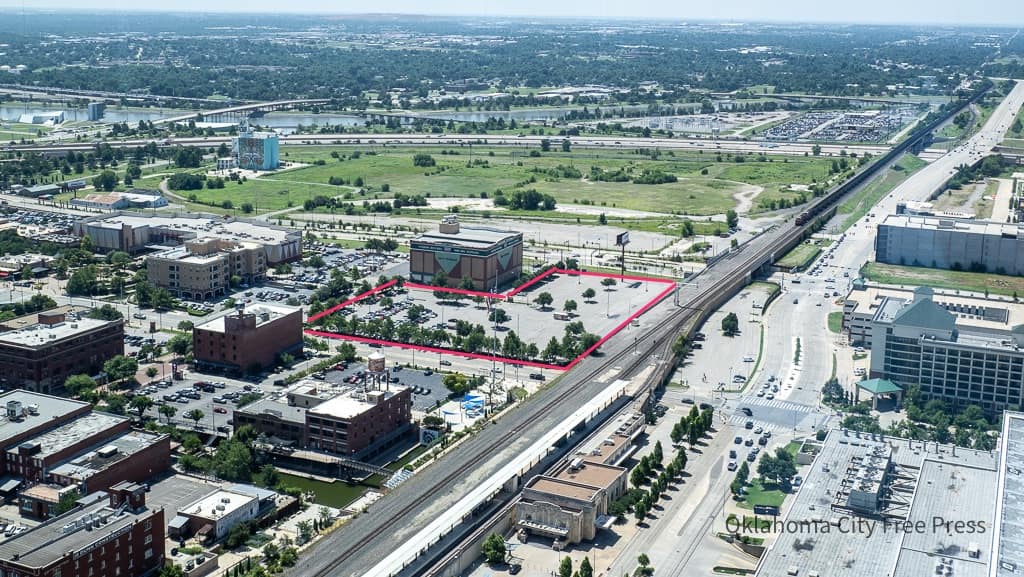Last Updated on August 16, 2023, 10:49 AM | Published: August 16, 2023
OKLAHOMA CITY — The Oklahoma City Council voted 7-2 Tuesday to extend hundreds of millions in subsidies for a private Bricktown development of mixed residential, commercial, and parking structures.
The City of Oklahoma City will contribute subsidies for the $732 million project by California developer Scot Matteson in the form of $200 million in TIF money and another $5.5 million in the form of tax reimbursements on construction taxes generated from the project.
When completed in June 2027, the development is planned to yield 924 residential apartments, over 75,000 square feet of commercial space, and 890 parking spaces. This will be one of the few residential high-rise projects to have been completed in recent memory having a footprint of only 3.9 acres designated within the red lines in our feature photo.
In addition, an “upscale” hotel is planned that will have 348 “keys,” meaning rooms or suites.
The presentation deck with concept art and details is embedded at the end of this article.

Tax increment financing
A TIF, or tax increment financing district, uses the increases in taxes collected from new development and returns them in the form of subsidies for a project over a limited time. Normally, those taxes would go to public institutions like schools and other public services.
While now widely accepted in Oklahoma City and many other cities, the TIF concept has received criticism both in OKC and across the country for being too generous with subsidies while depriving schools and other public services of much-needed funds.
Downtown Oklahoma City development has been incentivized with TIF subsidies over decades and is one factor in drawing new investment to what was a dying downtown.
And, over those decades, multiple overlapping TIFs established for different projects downtown have created a complex web of public subsidies for private development that is inexplicable in casual conversation.
Two Councilors object
While seven voted in favor of the project, only one, Mark Stonecipher spoke up praising the track record of the developer and the promise of the new infusion of development money into the core of the city.
Only two of the Council members voiced objections to the proposal in its final form Tuesday: Ward 2 Councilor James Cooper and Ward 6 Councilor JoBeth Hamon.
That was after two news publications, first Nondoc Media, and then, The Oklahoman, provided reporting in days leading up to the Council meeting.
The reports raised questions about the developers and a 2-year-old nonprofit they had formed recently. The developer’s young nonprofit seemed to some to be an effort to respond to concerns about affordable housing in the City. But, they had neither the experience nor the local connections to engage in a complex process of moving people from unhoused to housed and from unemployment to employment.

Developers promised to use a nonprofit to manage over 100 of the development’s residential apartments and provide services and “workforce training” to people who would not normally be able to afford to live there.
Cooper and Hamon expressed reservations about the fact that there’s no obligation on the developer’s behalf to work with the non-profit since the project is not reliant on the non-profit’s involvement, as outlined in the plan.

“My main contingent with most of these [deals], as I’ve said before, is that we don’t have a requirement for affordability and mixed-income as part of these projects, so it’s very nice to hear that a private developer is interested in partnering with a non-profit entity to do this sort of work but there’s still nothing tying them to require them to do that,” Hamon said during the meeting. “If they decided in two years as their prices go up or they work on construction, or whatever, that they wanted to scrap all of those ideas and just do something completely different they could do that.”
Cooper mentioned that while he came close to supporting this item, he ultimately couldn’t vote in favor due to the absence of local non-profit involvement and the relatively low emphasis on the affordable housing aspect within the plan.
“My worry is the workforce affordable housing component, again, there are no parameters within the agreement,” Cooper said. “It just strikes me as still a bit of a missed opportunity to partner with local groups to do this work… I just think we have to be way more intentional when it comes to who the service providers are, their experience, and those outcomes being part of the deal – not just part of the deal but prioritized within the deal.”
The following is the presentation deck from the developer showing the concepts of the development:
PRESENTATION-Boardwalk-at-BricktownBrianna Garcia contributed to this report.
Founder, publisher, and editor of Oklahoma City Free Press. Brett continues to contribute reports and photography to this site as he runs the business.










